
HOME | Contact | Place Orders
1 cent | 5 cent | 10 cent | 25 cent
50 cent | Dollars | Newfoundland | Tokens
World coins

 |
 |
CANADA 25 CENTMature Head, 1870 to 1901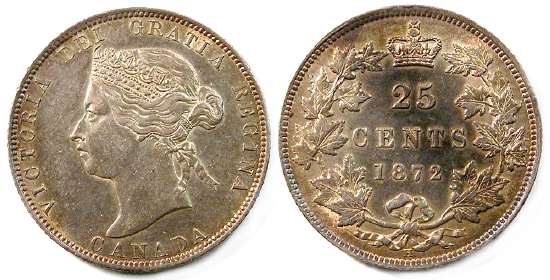
(image of type only)In recent years the value of silver has risen dramatically and this significantly affects the base price at which I can offer silver quarters. At the time I am writing this silver is about $21.75 per ounce (Canadian funds). From 1870 to 1919 Canada quarters are struck to a standard of 5.81 grams of 92.5% (sterling) silver so at currently have about $3.75 worth of silver in them. From 1920 to 1966 there were struck to a standard of 5.83 grams of 80% silver so currently have about $3.26 worth of silver. 1967 and 1968 quarters are slightly less. Considering the time and costs involved in listing, processing orders and arranging shipping the base price at which I can afford to list even the commonest dates of between 1870 and 1919 is $5.50 (generally not a problem for dates before 1908) and between 1920 and 1967 is $5.00. Examples worth less than that I send out to recover the silver. These base prices will change as the price of silver changes and I will make adjustments as I update this page.
No Canadian 25 cents were struck in 1873
No Canadian 25 cents were struck in 1876 to 1879.
No Canadian 25 cents were struck in 1884
No Canadian 25 cents were struck from 1895 through 1898
EDWARD VII
|
1902 25 cent
|
1902 H 25 cent
|
1903 25 cent
|
1904 25 cent
|
1905 25 cent
|
1906 25 cent 1906 quarters are found with two varieties, large and small crown defined by the size of the crown above the 25 on the reverse. The rare small crown is slightly narrower than the 25, while the common large crown is about the same width, a difference visible in any grade. Small crown examples are normally encountered in grades of aG-3 to G-6 with examples above VG-8 rarely seen.
|
1907 25 cent
|
With the opening of the Royal Canadian Mint at Ottawa in 1908 all Canadian coins are now minted in Canada. The designs and specification remain the same except all coins are struck with the medal die axis previously only used for one cents. Coinage axis means if you place your fingers above and below the portrait and spin the coin side to side, the reverse comes out upside down. Medal axis means it comes out right side up.
1908 25 cent
|
1909 25 cent
|
1910 25 cent
|
Many George V quarters have a weak area on the CA in CANADA due to excessive wear to that point on the dies. While they exist in all dates, for many dates examples with a strong CA can be difficult to find and they command prices higher than the typical weak ones. The prices in the Canadian Coin News trend sheet are for typical weak ones.
For examples where the CA is nearly gone I will describe them as having a weak reverse. When the CA completely gone, which is common on coins in VG or lower, I will split grade them by grading the coin for the obverse and then giving a second grade for the very weak reverse (such as VG-8/G-4), more better describes the coin and I will price them accordingly lower than a normal VG-8.
1911 25 cent George V coins were introduced in 1911 with "DEI GRATIA", Latin for "God's Grace", omitted from the obverse inscription. Known as the "GODLESS COINS" there was a public outrage over them.
|
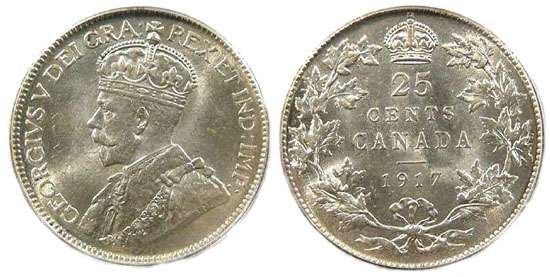
1912 25 cent In 1912 "DEI GRATIA" returned to obverse inscription of all Canadian coins.
|
1913 25 cent
|
1914 25 cent
|
1915 25 cent
|
1916 25 cent
|
1917 25 cent
|
1918 25 cent
|
1919 25 cent
|
1920 25 cent
|
1921 25 cent The mintage of 1921 25 cents was just less than 600,000 which is low compared to the high mintages in the preceding years, and the coins are slightly scarcer than even that would predict so it might be that some were melted just as the 5 and 50 cents were, although there is no official record for such a melt. A very high percentage of the coins have a weak to very weak CA on the reverse, sometimes completely gone on coins VG or lower and such weakness is to be expected in the lower grades.
|
No Canadian 25 cents were struck in from 1922 to 1926 with both 1921 and 1927 being scarcer than average. Between 1917 and 1920 there were large mintages resulting in a large supply of coins already in circulation by 1920. In 1920 and 1921 Canada suffered a deep depression followed by several years of recession in much of Canada so there was low demand for coins. With enough coins in circulation to supply Canada's needs, the mint stopped striking 10, 25 and 50 cent coins for a number of years, and reduced minting 1 and 5 cent coins. Minting of 25 cents resumed in 1927 and they have been made every year since then, although mintages were low during the depression years of 1930 to 1935.
1927 25 cent The mintage of 1927 25 cents was just under 500,000 so slightly lower than the 1921's and are also somewhat scarce.
|
1928 25 cent
|
1929 25 cent
|
1930 25 cent
|
1931 25 cent
|
1932 25 cent
|
1933 25 cent
|
1934 25 cent
|
1935 25 cent
|
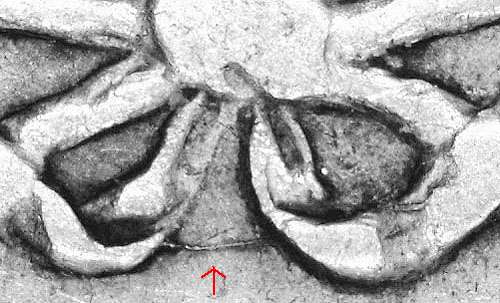
A die break between the ribbons of the reverse is found on some 1936 quarters creating the bar variety which is found on both regular and 1936 dot quarters. The die break varies in length and width, showing it occurred on multiple dies however only examples with a strong clear die break are considered to be the bar variety. I have seen weak die breaks in the same position on some earlier dates.
1936 25 cent
|
Edward VIII accessioned as King in 1936 and preparations to strike 1937 coins with his image were made. When he abdicated in December of 1936, making George VI king, the Edward VIII dies could not be used and completely new dies had to be produced. The masters from which dies were made had to be prepared in England but without enough time, and having to do them for the entire British Commonwealth, they could not be ready when new coins were needed in 1937. As commonwealth rules said 1937 coin could only be struck with George V, early in 1937 Canada struck 1, 10 and 25 cent coins dated 1936 using the portrait of George V but a small dot was placed below the date indicating struck in 1937. Only the 1936 dot quarters were actually issued and are now available to the average collector. While many 1936 dot 1 and 10 cent coins were struck in abundance, all circulation strikes were destroyed when the new dies for the 1937 designs arrived. The few 1 and 10 coins that now exist are specimen strikes clouded in controversy as none were known prior to the mid 1940's when they suddenly appeared in the hands of a single collector and the mint master. It is certain they were made at the Royal Canadian Mint and are not simply fakes, but when they were made is uncertain.
1936 DOT 25 cent 1936 dot quarters are normally seen with the CA of CANADA very weak or not visible at all. This is due to a combination of die deterioration and excessive wear. The prices on the CCN trend sheet assume some weakness in that area. Examples with a strong CA are scarce and worth a premium. This suggest the dies used for this coin may have been left over already slightly used regular 1936 dies with the dot added. When I grade these as a single grade without comment, you should assume the CA will be weak but when it is excessively so I will split grade them listing first the Obverse, then the with how it actually looks. When I use aG-3 there is very signficant weakness and 1 in the date may be gone. Fair-2 means excessve weakness and the 19 in the date may not be visible.
|
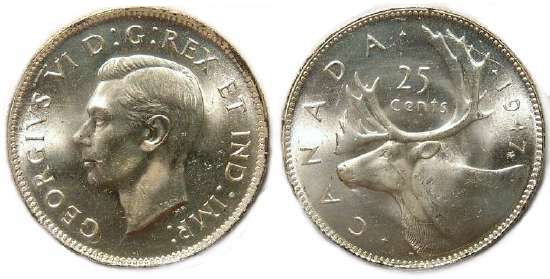
1937 25 cent
|
1938 25 cent
|
1939 25 cent
|
1940 25 cent
|
1941 25 cent
|
1942 25 cent
|
1943 25 cent
|
1944 25 cent
|
Canadian 25 cents from 1945 to 1962 are mostly very common coins but most examples that come in are worn and only worth the value of the silver they contain, not enough to justify the time and trouble to package and list them here. I usually have a good selection of the higher quality more expensive examples, but for many dates I nearly always sold out of the upper middle grades that are of enough value to list, but not too expensive. Once you get to 1963 the coins become very common in even high grades because there are a lot of original rolls around, so very nice examples are available inexpensively.
1945 25 cent The mintage of 1945 quarters at just over 5,000,000 is not particularly low but recently I have noticed I am having difficulty finding examples in the VF-30 to MS-60 range that are worth enough to catalogue, but not overly expensive for the average collector. I have no idea why they are proving difficult but it suggest a lower than average survival rate.
|
1946 25 cent
|
1947 25 cent There is a variety of the 1947 quarter with a very small dot behind the 7 which results from a deteriorating die. This variety is popular with collectors because the dot is in a similar position as the maple leaf on the 1947 ML quarters (discussed below). Note that on examples grading below Fine the dot might be difficult to see without good magnification. Many people see a maple leaf and think it is the dot, but the dot is much smaller and for most people is they can see it with the naked eye it probably is not the dot type.
|
India received its independence on August 14, 1947 requiring that IND IMP (India's Emperor) be removed from all British Commonwealth coins dated 1948 or newer. A problem similar to that in 1937 when Edward the VIII abdicated, the new obverse designs for coins all over the British Commonwealth had to be prepared at the Royal Mint in England. Those for Canada were not ready at the beginning of 1948 and coins were needed, so early in 1948 coins were struck dated 1947 so that the IND IMP design could still be used but a small maple leaf was placed after the date indicating minted in 1948.
1947 MAPLE LEAF 25 cent
|
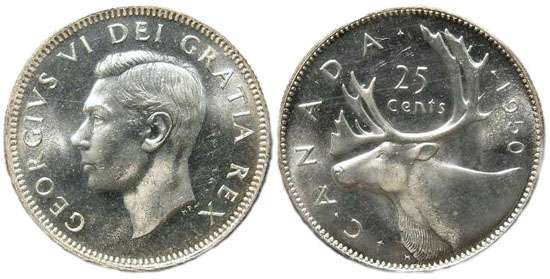
When the new designs arrived in 1948 with IND IMP (India's Emperor) removed, the entire inscription now reads GEORGIVS VI DEI GRATIA REX (George VI By The Grace of God King) and was used until 1952.
1948 25 cent
|
1949 25 cent
|
1950 25 cent
|
1951 25 cent 1951 quarters are found with high and low relief varieties which can be identified by how final A in GRATIA points at a denticle on high relieve examples, and between two denticles on low relief examples. All circulation strikes issued in bank rolls are high relief so common. Low relief examples are only found in some mint sets with Proof-like strikes and are scarce. The two obverse design likely are part of the high vs low relief redesign for nickels to accommodate the steel blanks introduced that year. There is obvious reason to have done so on quarters as they are on the same silver allows as previous years.
|
1952 25 cent 1952 quarters also occur with high and low relieve with both types were issued for circulation.
|
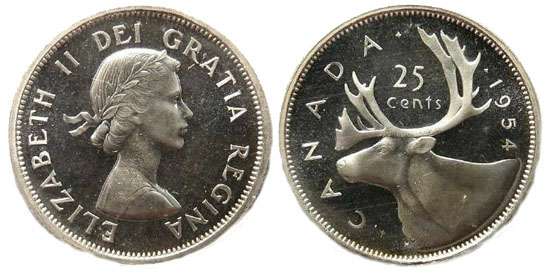
1953 NSF 25 cent The early 1953 dies had the shoulder fold weakly cut so the shoulder fold was usual not present, although on some well struck examples you may see a trace of it. This made the Queen's shoulder appeared bare which many people thought to be inappropriate. Known as the No Shoulder Strap (NSS) or No Shoulder Fold (NSF) variety, the easiest way to determine these is by the strong serifs at the top and bottom of the I's in II and DEI on the obverse. The NSS coins have a large date and wire or narrow rim.
|
1953 SS 25 cent Later in 1953 the dies were re-designed with a deeper shoulder fold which usually will be visible on the coins, although not on some weaker strikes. Known as the Shoulder Strap (SS) or Shoulder Fold (SF) variety, the easiest way to be certain of this variety is because the serifs at the top and bottom of the I's on the obverse are much smaller to the point the I's nearly appear straight. The reverse was also redesigned, making the date smaller and giving the coins a slightly wider rim.
|
1954 25 cent
|
1955 25 cent One 1955 die had fairly dramatic doubling of the date resulting in what is known as the double 1955 variety. Double date examples are very difficult to find and I seldom have one available but when I do I will note it in the description.
|
1956 25 cent
|
1957 25 cent
|
1958 25 cent
|
1959 25 cent
|
1960 25 cent
|
1961 25 cent
|
1962 25 cent
|
1963 25 cent
|
1964 25 cent I recently had a number of cameo and ultra cameo MS 1964 25 cent from a bank roll I opened myself. Most has a PL look on one and sometimes both sides, but some looked MS on one side. It appears the mint was using some left over PL dies for MS strikes when that roll was minted.
|
1965 25 cent
|
1966 25 cent
|
To celebrate Canada's 100th anniversary as a country, all of the standard circulating coins in 1967 depicted animals common to Canada, with a lynx on these 25 cent coins. These are common coins and average ones get sent out to scrap the silver, so the examples offer will all be very nice examples, either from Proof-like and Specimen sets, or circulation strikes grading MS-63 or higher, often with a cameo portrait and/or lynx.
During the first half 1967 these were struck to the 800 fine standard and contain 0.15 ounces of silver. During the last half of the year, they were struck to a 500 fine standard containing 0.094 ounces of silver. For circulation strikes (MS or BU) there is no simply way to tell them a part so silver value examples are bought and sold based on the average of 0.1225 ounces of silver. All of the Proof-like and Specimen quality were struck earlier in the year and so are the 800 fine standard.
The cases for the 1967 specimen sets, either in the red boxes with the silver medallion or the black box's with the $20.00 gold piece had something in the lid liner than often reacts with the coins causing heavy toning. Most of the time the toning is very unattractive and I scrap those coins as it has usually corroded the coins, sometimes the coins take on a very attractive blue tone and I try to preserve those.
1967 25 cent
|
1968 saw a return to the standard Caribou reverse design. Early in the year, these were struck in silver at the 500 fine standard, containing 0.0937 ounces of silver per coin but unless very high quality (MS-63 or better) they are just worth the value of the silver they contain. Those struck later in the year are pure nickel and contain no silver. While a practiced eye can see the color difference, for most people the easiest way tell them a part is with a magnet as nickel ones stick to a magnet and silver ones do not. All 1968 quarters in Proof-like sets are nickel.
1968 SILVER 25 cent
|
Please note that up to 2011 when I describe a coin to be Proof-like (PL) I mean a coin from a mint set, intestinally struck to a higher quality than normal, but worth less than a MS (Mint State) coin from a bank roll in the same grade. They are fairly easily differentiated by their strike and luster. ICCS and some references call such coins "NON-CIRCULATING NUMISMATIC MINT STATE" which I feel will cause confusion in beginning collectors. Starting in 2012 the mint stopped making intentionally nicer coins for the standard sets and the coins are all simply MS (mint state) except for specimen and proof examples.
As discussed above, during 1968 the alloy of our quarters was changed from 50% silver to pure nickel and there with no change in size or weight but a magnet can be used to tell them a part for 1968, and all dated after 1968 are nickel.
For the majority of dates, nickel 25 coins are very common and not worth the time and trouble to list for sale unless of exceptional quality, usually from proof-like, specimen or proof sets, or for the few rare dates and/or varieties which will discussed below where appropriate.
If you don't see a particular date listed here, please do not assume it is rare as it is more likely to be too common (thus low value) for us to list.
1968 NICKEL 25 cent
|
1969 25 cent
|
1970 25 cent The mintage of the 1970 quarter was around 10,000 which was only a fraction of most other dates in this period. At the time it created a lot of interest in these, and some people still consider then scarce, but after the 1991 came out with a mintage under 500,000, they lost a little of the lustre but are still a little harder to get them other dates.
|
Beginning in 1971, the mint begins striking three different striking qualities of coins, with a fourth added in 1981 :
Mint state (abbreviated MS) which are coins struck for issue through the banks and have average lustre and surface qualities. In most cases MS coins have little value unless in the highest range of the MS coins, and those are seldom seen. I don't list most dates in MS because they are not of enough value to justify the time and trouble to list and/or ship them.
Proof-like (abbreviated PL) are standard mint set coins, usually from the pliofilm packaged sets, red double penny sets, and later the blue book set, but in later dates there were a variety of other types of sets they can come from. PL coins have a much higher lustre than MS coins, mostly because they are struck from dies in their newest die state. They also have very minimal marks (the average PL is a PL-64) as they did not go through as many of the mint handling processes as MS coins do, but they are not perfect coins and one should not expect them to be absolutely mark free.
Specimen (abbreviated SP or SPEC) which were in the black leather double dollar sets from 1971 to 1980, and for later dates in various types sets. Like PL coins they are struck from dies in their freshest die state but differ in being double struck to give them a higher lustre and sharper images, and they do not go through any mint handling processes before going into the sets so are nearly mark free. The rims tend and edges tend to be a little sharper although this is not obvious on a casual inspection. When I list a coin as a specimen, I have personally taken it out of a specimen set.
Proof (abbreviated PR) coins are very nice coins found mostly issued in the double dollar black leather boxed proof sets starting in 1981, although some specialty coins did come other ways. The coins are clearly differing from the other striking qualities by being double struck from specially prepared dies so they have mirror fields and frosted images (and ultra cameo effect) and are specially handled so they go into the sets in near perfect condition as possible.
1971 25 cent
|
1972 25 cent
|
1973 25 cent 1973 quarters commemorate the 100th anniversary of the Royal Canadian Mounted Police. The reverse shows a Police officer on horseback. The obverse Queen's head is slightly modified from the 1972 so the head is slightly smaller, has more detail in the hair, more beads around the edge and the beads are further from the edge. Some 1973 quarters were struck with a 1972 obverse die, where the Queen's head is larger and the beads are closer to the rim. Known as the "large bust" variety, these are found in circulation, proof-like and specimen strikes. The mintage is not known but most estimates are around 13,000 with half in circulation strikes and half in proof-like and specimen sets. While most Specimen and PL examples are rated 64 or better, MS examples are rarely seen above MS-63. The red flocking in 1973 specimen sets (double dollar) sets is deteriorating and causing mild corrosion to the obverse of coins still in the sets, resulting in grey discolorations that cannot be removed without damaging the coins. I have seen several such coins in certified holders that did not mentioned the corrosion. I feel it should be mention as it reduces the value.
|
1974 25 cent 1974 saw a return to both the regular caribou design, and the larger Queen's portrait used prior to 1973.
|
1975 25 cent
|
1976 25 cent
|
1977 25 cent
|
1978 25 cent The 1978 25 cent comes with large or small denticles on the reverse, easily differentiated by one feature where opposite the N in CANADA, betweem the legs of the N the small bead has four denticles and the large bead only three. Both types occur in circulation strikes but all examples in mint sets are large denticles.
|
1979 25 cent
|
1980 25 cent 1980 25 cents are found in all striking methods, MS, PL and Specimen, with two obverse varieties of near and far beads as defined by the gab between the beads around the Queen's head and the rim. Near bead examples have a gap about the width as a bead while far beads examples have a gap just over one and a half times the width of a bead. It appears far beads were struck earlier in the year as the previous years were that type, near beads were struck later as the following years are also that type.
|
1981 saw the introduction of proof sets to replace the double dollar specimen sets. The proof coins have frosted images against mirror fields and while specimen strikes continued to be struck, they were in other types of sets. Whether proof or specimen coins are easier to get as single coins, depends mostly in the value of the intact sets they come from. Generally after 2012 most proof sets are worth more intact than broken up so those coins are harder to get in proof.
1981 25 cent
|
1982 25 cent
|
1983 25 cent Just over 13 million 25 cents were struck for circulation in 1983, less than 1/3 of any other year between 1971 and 1990, and about 10% of most years. Most ended up in circulation so no longer in mint condition. There were also about 190,000 proof-like sets, 60,000 specimen sets and nearly 167,000 Proof sets which are not low mintages for these types of sets, and nearly all are still in mint condition. This is why 1983 quarters are difficult to find in circulation but more easily obtained as proof-like, specimen or proof strikes.
|
1984 25 cent
|
1985 25 cent
|
1986 25 cent
|
1987 25 cent
|
1988 25 cent
|
1989 25 cent
|
1990 25 cent
|
1991 25 cent In 1991 only about 459,000 25 cents were struck for circulation, making them the lowest mintage of circulation strike quarters in the more recent series and you have to go back the 1936 dot quarter to find a lower one. Very few actually entered circulation so most are now encountered still in mint condition. There were an additional about 147,800 in PL sets, 76,600 in specimen sets, and 131,900 in proof sets for a total mintage of just over 815,300.
|
Beginning in 1992 but especially after 1999, we see a wide variety of quarters being struck, including the standard caribou design, various special commemorative types both for circulation and non-circulating types, with some commemorative types being partly colored. For coins listed below, I will indicated any of the colored coins as colored. PLEASE NOTE THAT ANY OF THE SPECIAL COMMEMORATIVE OFFERED BELOW ARE IN STANDARD 2x2 HOLDERS and those originally issue in official packaging are no longer in that original packaging unless otherwise stated.
1992 25 cent For Canada's 125th anniversary of confederation 25 cent coins were struck for each of the 12 provinces and territories with designs specific to those areas. The commemorative designs were struck from pure nickel in MS and proof-like, as well as sterling silver Proofs. The Proof-like examples came in sets of the 12 quarters mounted in florescent colored card holders, while the silver proofs were issued in a plush blue box. Both the proof-like and proof sets included an aureate dollar with the Parliament design. No circulation (MS) caribou 25 cents were struck but about 217,600 were issued in the regular PROOF-LIKE sets, 78330 in SPECIMEN sets and about 174,100 in the standard PROOF sets, bringing their total mintage about 470,000, far less than 1991 that people think of as scarce. All 1992 25 cents, both of caribou and commemorative designs, are double date as 1867-1992.
|
In 1993, the standard caribou design 25 cents were again struck for circulation.
1993 25 cent
|
1994 25 cent
|
1995 25 cent
|
From 1996 to 2011 all Proof strikes of standard 25 cent coins are of sterling (92.5%) silver at 5.9 grams. Proof-like, specimen and circulation strike coins continue as pure nickel at 5.05 grams, and later dates on nickel plated steel blanks. The holders for proof sets are not sealed air tight, so air can get in and often causes the silver coins to develop a light golden brown toning, especially around the edges. Tone free (pure white) examples can be difficult to find for some dates. One should expect at least a little toning around the edges on these coins, which can be fairly attractive, but if you prefer white tone free examples please specify such on your order and I can usually accommodate such requests. Examples with heavier toning will be noted in the descriptions.
1996 25 cent
|
1997 and 1998 no 25 cents of any design were struck for circulation (MS). 1999 and 2000 only commemorative 25 cents were struck for circulation, but note with the standard caribou design. However 1997 through 2000 quarters with the caribou design are available in a variety of mint set types.
1997 25 cent While none were struck in MS quality for circulation, 1997 saw about 174,700 in Proof-like sets, 97,600 in Specimen sets and about 113,650 silver examples in proof sets for a total Mintage around 385,950 examples. While proof-like sets were minted at both Ottawa and Winnipeg and one can determine where an intact set was minted, it is not possible to differentiate between the Ottawa and Winnipeg coins once removed from the sets. While the CCN trend sheet lists different prices for the Ottawa and Winnipeg examples, I price all 1997 Proof like quarters as the less expensive Ottawa.
|
1998 25 cent While none were struck in MS quality for circulation, 1998 saw about 192,140 in proof-like sets, about 67,700 in specimen sets and about 93,630 in silver Proof sets for a total mintage about 353.470. At the beginning of 1998 the proof-like sets were made at the Winnipeg mint with a small "W" mint mark below the Queen's head. Later the production was moved back to Ottawa where the coins do not have any mint mark. The 1998 25 cents with "W" mint mark are scarcer than those without but both are scarcer than 1991 25 cents. The finish on 1998 proof-like coins returns to high luster finish used before 1996, but specimen coins retain the slightly matte fields with high lustre designs that was first used in 1996.
|
1998 COMMEMORATIVE 25 cent To commemorate the Royal Canadian Mint's 90th anniversary special sets were struck with the sizes, sterling silver alloy (other than the 1 cent), and general reverse designs of the 1908 coins, but with an obverse showing Queen Elizabeth's portrait and date as "1908 - 1998". The early sets have an antiqued matte-proof finish that proved unpopular with collectors so were discontinued and are now the scarcer of the two finishes. The later sets are mirror-proofs.
|
1999 25 cent 1999 was an interesting year for Canadian quarters with the Caribou design was struck only for the mint sets but 12 different quarters commemorating the Canadian provinces and territories were issued for circulation as well as in proof-like and silver proof sets. PLEASE NOTE THAT FOR THE OFFICIAL PROOF-LIKE SETS, WHILE THE SETS INSIDE THE BOXES AND THE COINS WILL BE IN PERFECT CONDITION, THE OUTER PROTECTIVE BOXES WILL ALMOST ALWAYS BE SLIGHTLY BEAT UP (this is just the way they normally come to us). An interesting error occurred when some September and November 1999 quarters were struck with an obverse die intended for the Caribou quarter, resulting in quarters missing the "25 CENTS" the commemorative's usually have below the Queen's bust. These are known as mule errors and are only found in some of the official 1999 quarter sets, most likely in sets made in August of 1999 and sold through the post offices. The total mintage for the 1999 caribou quarters was about 192,140 in proof-like sets, 46,785 in specimen sets and about 95,115 in proof sets for a total mintage of about 334,040 examples.
|
1999 P TEST 25 cent In 1999, as a cost saving measure, the Canadian Mint made plans to strike 1, 5, 10, 25 and 50 cent coins on nickel plated steel blanks which were first nickel plated, then copper plated and then for all denominations other than the 1 cent, nickel plated again. A P was placed below the Queen's portrait to indicate a plated steel blank. First struck only as test tokens for vending machine companies for calibrate purposes, those companies were supposed to return them to the mint. Some ended up on the market at very high prices so the mint got in on the action selling 20,000 sets to collectors at much lower prices. Packaged like Proof-like sets their exact status is unclear and I prefer to call them Proof-likes, but others including ICCS call them Mint State. A mintage of only 20,000 means they are nearly as scarce as 1948 dollars. The vinyl packaging leaves a light film on them that can be removed with rubbing alcohol.
|
In 2000 the first circulation strike "P" coins were minted, but only on 5 cent coins were coins were officially released for circulation (both plated "P" and solid nickel without the "P" 5 cent pieces were minted in 2000). A few 2000 dated "P" 10, 25 and 50 cent coins were struck, and while they were never officially released for circulation, some have turned up having been accidentally released. 2001 saw the official issues of other denominations begin to appear.
2000 CARIBOU 25 cent 2000 was another interesting year for 25 cent coins, with all circulation coins special commemorative's of Canadian attributes. The Caribou design is in the normal mint sets, but special sets of the 12 commemorative types were also issued both in plated steel, and solid silver Proof's. PLEASE NOTE THE OFFICIAL PROOF-LIKE SETS OF COMMEMORATIVE QUARTERS I OFFER BELOW WILL HAVE THE COINS IN PERFECT CONDITION, BUT THE OUTER PROTECTIVE BOXES WILL ALMOST ALWAYS BE SLIGHTLY BEAT UP (this is how they normally come to us). A rare mule error occurs in a few of 2000 millennium quarters sets when an Queen's head obverse die was used with the map medallion reverse. These are much rarer than the 1999 September and November Mule quarters. The mintage for the 2000 Caribou quarter was about 186,985 in Proof-like sets, about 78330 in specimen sets and about 87,965 in proof sets for a total mintage of about 353,280. The Proof-like set mintage included both the regular and W coins, making the 2000 W quarter one of the scarce coins in this series. Canada's first colored coin was issued this year when the January pride 25 cent was also issued with large red 2 over 3 red maple leaves, over a larger white maple leaf. Other than the color it is the same design as the January pride type issued for circulation, and is not part of the Canada series. 2000 saw the first of an annual series of Canada Quarters running until 2008, where some examples of the "celebration" quarter had red color added to the flag in front of the family. This type did not sell well and is now the scarcest of the Canada Day quarters.
|
2001 25 cent In 2001 the caribou design returned for circulation and most mint sets. Circulation strike examples exist with and without the P for plated, with examples without the P scarcer. Silver proof examples are also without the P. All examples in Proof-like and Specimen have the P below the Queen's portrait. A type with children standing around a red maple leaf was issued as a Canada Day celebration but only as a Proof-like, with the P.
|
2002 25 cent For the 50th anniversary of the Queen's accession most coins, including all 25 cents are double dated with 1952 above 2002 to the left below the Queen's portrait. I get phone calls from people saying they have a quarter without a date and I have to tell them to turn it over. All 2002 quarters other than silver proof examples have the P. The Canada day quarter for 2002 shows a group of people, some holding up a large maple leaf with others sitting on it, with a ribbon wrapping around it. Circulation (MS) and proof-like strikes were issued without color plus some proof-likes with a red maple leaf were sold as single coin for collectors. Both the CCN trend sheet and Charlton catalogues do not list a proof-like (non-circulating MS) without color but they are fairly common in the purple special edition mint sets.
|
2003 was an interesting year for Canadian coins, with a number of varieties including the introduction of a new effigy of the Queen without a crown.
2003 25 CENT Old Effigy Coins struck earlier in 2003 have the crowned effigy of the Queen first introduced in 1990 and are found both with a P below the Queen's bust on plated steel or without the P on solid silver blanks from proof sets. Most proof-like and all specimen and normal proof sets in 2003 are of this bust type. The Canada day quarter for 2003 was only issued for collectors, showing a polar bear looking at red maple leaves, and has the old effigy with P. There is also a special silver proof issue commemorating the 50th anniversary of the Queen's coronation, using the youthful portrait from 1953, flanked by the dates 1953 2003.
|
2003 25 CENT New Effigy Later in 2003 the Queen's bust was redesigned without a crown. Timed to celebrate the 50th anniversary of her coronation, the new effigy Coronation Portrait was introduced showing her without a crown but as it became the standard portrait for later years it is commonly known as the New Effigy. All New Effigy examples are on plated steel with the P. Those with just the P are only found from bank rolls for circulation with some Proof-like sets struck at Winnipeg found with WP to designate the Winnipeg mint, the only time the W and P appear on coins at the same time.
|
Beginning in 2004 the mint went crazy with special commemorative quarters with several in most years and at lease 15 different one year, most never intended to circulate. Listing them all would be a huge undertaking and a long list, so below I will list them as I get them, marking them sold as I run out but leaving the information for the type in place. It is likely some types I may never add.
2004 25 cent Three types issued for circulation in 2004, the caribou type, First Settlement in Canada depicting the ship St. Croix and a remembrance day with a red poppy. Worried the red color wearing off too easily the mint applied a thin lacquer coating that shows as a slight iridescent area around the poppy. The caribou is found in MS, PL, Specimen and Proof. The red poppy is found in MS and PL (in the first day cards). The first settlement is found in MS, and I am not certain if a PL in a first day card exists but I have not seen one. A few other special commemorative exists in proof-like or Proof.
|
2005 25 cent Four type of circulating 25 cents were issued in 2005. The caribou design is found in MS, PL, Specimen and Proof. The Alberta depicting an oil rig, the Saskatchewan depicting a bird in front of a grain elevator and the Veterans depicting conjoined busts of a young soldier and elderly veteran, were all struck in both MS and PL, with the Proof-likes issued in the official first day cards, although most I list have been taken out of the cards. A few other types also exist, mostly in Proof-like or specimen.
|
2006 25 cent All 2006 25 cents, other than silver proofs are on plated blanks. Those struck early in the year have the P for plated while later ones have a stylized maple leaf mint logo. All Specimen strikes have the P and silver proofs are without either the P or logo. Proof-like sets were made through out the year and are found with either the P or logo. Four circulating types were struck, the Caribou with the P is found MS, PL and Specimen. The Caribou with mint logo found in MS and PL (both more difficult to find). The breast cancer with central pin ribbon with the P in MS and PL. The medal of bravery type with mint logo found in MS and PL. In both the breast cancer and medal of bravery the PL examples came in First day of issue cards although most I list have been taken out of the cards. A peculiarity introduced in 2006 were 35 mm Giant Quarters struck over the next years in various designs, mostly of specimen (SP) quality with color.
|
2007 25 cent Six 25 cent types were issued for circulation. The caribou with mint logo in MS, PL, Specimen and as a silver proof. Four types, alpine skiing, ice hockey, biathlon and curling and Paralympic wheelchair curling were for the upcoming 2010 Olympics with 2010 on the reverse and 2007 below the Queen's head, with the Olympic logo to the left of the Queen's head instead of a mint logo, all issued in MS, PL and Proof. The Paralympic wheelchair curling should have the Paralympic logo but some were accidentally struck with a obverse die with the standard Olympic logo and are known as mule errors. 2007 and 2008 Olympic quarters were issued through Petrocan but with the maple leaf outline in red, a hard plastic bubble over the reverse (very difficult to remove) and mounted in card holders in which I leave these in the card holders when I have them. In these cards one sometimes finds the Paralympic quarter with standard Olympic symbol, and some alpine skiing accidentally dated 2008, both being mule errors.
|
2008 25 cent Six different 25 cent coins were issued for circulation in 2008. The Caribou with the mint logo below the Queen's head was issued in MS, PL, Specimen and as a silver proof. A remembrance day poppy quarter with the mint logo was issued in MS and PL. Four types were issued for the upcoming 2010 Olympics with the 2010 Olympic date on the reverse and the actual date of issue below the Queen's head, with the Olympic logo to the left of the Queen's head, figure skiing, snow boarding, bobsledding and freestyle skiing. They were all issued MS, PL and Proof. All of the Olympic types were issued in a variety of cards and book marks, some with a painted red line on the partial maple leaf and all with a non-removable plastic bubble over the reverse. Some Alpine Skiing examples in the Petrocan cards for 2007 are mule errors dated 2008.
|
2009 25 cent Seven different 25 cents were issued for circulation in 2009. The Caribou with the mint logo below the Queen's head was issued in MS, PL, Specimen and as a silver proof. Two for the 2010 Vancouver Olympics, cross country skiing and speed skating, with 2010 Olympic date on the reverse and the 2009 issue date below the Queen's head with the Olympic logo to the left. A sledge hockey type for the 2010 Paralympics with the 2010 Paralympic date on the reverse and the 2009 issue date below the Queen's head. The Olympic and Paralympic types come on MS, PL and Proof. There are three types commemorating past Olympic moments, the 2002 Men's gold medal which can have final 2 in the 2002 either raised or incuse (engraved line around it), the 2002 women's hockey gold medal, and Cindy Klassen's 5 medals in the 2006 Olympics. All have the 2009 date in the obverse inscription and are without logos below the head. They all come with or without red on the background maple leaf which can be either printed (dot texture) on MS and most PL examples, or the much scarcer painted (solid without texture) on some proof-like examples. Some are found mounted in Petrocan (PC) cards with non-removable yellowish plastic bubble over the reverse.
|
2010 25 cent With the Olympic coin program finished, only two types were struck for circulation in 2010, the caribou with the mint logo below the Queen's head and the remembrance day type with a soldier standing between two red poppies, with nothing below the Queen's head. The caribou type comes in MS, PL, Specimen and silver proof. The remembrance day type comes in MS (bank rolls) and while they were issued in a type of mint set, the coin in those sets seem to be MS rather than PL quality.
|
In 2011 the mint stopped making intentionally superior quality coins for Proof-like (standard) mint sets, rather using normal mint state coins that had not gone through all of the mint handling processes rolled coins go through. With no way to differentiate between coins from sets vs bank rolls, all coins other than Specimen and Proof coins are designated as Mint State (MS). It can be difficult to find orginal rolls of these later dates, and the mintages of mint sets is not huge, so the prices variety from year to year for the various grades.
At this point examples 2011 and newer are difficult to get in all striking qualities. The mint rolls seldom come in, specimen sets were made in only limited quantities, and most mint sets are worth more intact than cut up, so I seldom do so.
2011 25 cent Four types, plus three varieties of 25 cents were struck in 2011 for circulation, the caribou, falcon, bison and orca. There are also three varieties as the falcon, bison and orca are each found with and without a colored moon in the background.
|
From 1996 until 2011 all silver colored coins in normal mint sets were struck of silver but starting in 2012 they mint made them in both silver and nickel plated steel, and the only way to differentiate them is with a magnet which will not attract to the silver examples.
2012 25 cent There were three circulating designs for 2012, the caribou and two celebrating famous people from the War of 1812, the Native Chief Techumseh and Sir Isaac Brock. Both 1812 designs are found with a red maple leaf to the lower left of a mirror finish portrait, and the maple leaf without the red to the left of a matte finish portrait. The caribou is found in MS both in rolls and sets, specimen and silver proof. The War of 1812 designs are only struck in MS, mostly in bank rolls but some in 5 coin collector sets using MS coins. For the special non-circulating commemorative's on standard non-colored blanks, it appears the mint returned to proof-like strikes as the examples I am seeing certainly look that way.
|
2013 25 cent
|
2014 25 cent
|
2015 25 cent
|
2016 25 cent
|
2017 25 CENT Canada's 150'th anniversary as a country was celebrated in 2017, and both regular coins and special anniversary coins were issued that year. The 25 cent caribou type is the most common with a mintage of 78,220,000 for circulation, plus those in mint sets. The 150'th anniversary type called the Green Future, depicting a pair of hands from which comes a branch surrounded by a stylized dove, beaver and turtle, with about 20 million issued, so of which have blue, green and brown enamel on the animals on some examples. An additional roughly 12.5 million quarters were struck to commemorate the 125th anniversary of the Staley Cup, depicting two hockey plays either side of the cup.
|
2018 25 cent
|
2019 25 cent
|
Please note that up to 2010 I describe coins as Proof-like (PL) if they come from a mint set. PL coins are easily differentiated by their superior strike and luster, with only very minor bag marks and while nicer than MS coins from bank rolls they are easier to find in high grades and usually worth less. ICCS and some references refer to these as NON-CIRCULATING NUMISMATIC MINT STATE which I find confusing which is why I to call them Proof-like. In 2011 the mint started putting standard Mint State coins in the normal mint sets, although these bypassed some of the mint handling procedures so these coins will usually be MS-64 and MS-65. This makes those grades more common than for earlier dates. Specimen and proof sets still use specially struck coins with distinctive finishes.
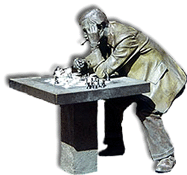
© 1997-2024 R & T Enterprises Ltd.